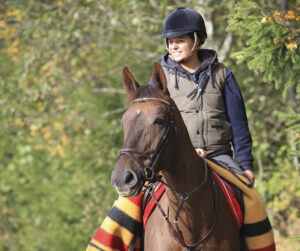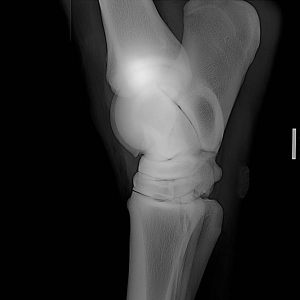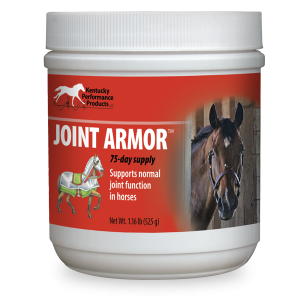
Winter Care for Arthritic Horses
Arthritis—inflammation in horses’ joints—is a common condition affecting many equine athletes, particularly senior horses, who also can have chronic, low-grade systemic inflammation known as “inflamm-aging” that may contribute to arthritis. The clinical signs of arthritis include
- Stiff joints, especially after rest
- Reduced range of motion
- Visible swelling in affected joints
- Changes in gait or reluctance to move
 These symptoms can appear in any season, but they’re often more pronounced in cold weather, presenting several challenges for horse owners managing animals with arthritic joints:
These symptoms can appear in any season, but they’re often more pronounced in cold weather, presenting several challenges for horse owners managing animals with arthritic joints:
- Increased Joint Stiffness: Low temperatures can cause joint fluid to thicken, leading to reduced mobility and increased discomfort.
- Reduced Activity: Horses may be less active in cold weather, worsening joint stiffness.
- Weight Management: Decreased activity can lead to weight gain, adding stress on arthritic joints.
Strategies for Winter Care
-
Continue Regular Exercise
Consistent, moderate exercise is crucial for maintaining joint health and overall body condition. Even in cold temperatures, try to give your arthritic horse some form of exercise. Provide daily turnout, weather permitting. If an indoor arena or covered area is available, use it for turnout or other exercise in inclement weather or if outdoor footing is frozen or poor. Even if you don’t plan to ride, handwalking, in-hand work, or similar low-impact exercise can keep your horse’s joints moving, strengthen the joints’ stability by maintaining supportive muscles and tendons, and help circulate the synovial fluid that lubricates them.
-
Add Warm-Up Time
Allow extra time for warm-up before exercise. Adding a 15-minute walk before your horse’s work, then stepping up to the trot and then canter, increases blood flow to the joints and muscles as they work, helping reduce the risk of injury and discomfort. Gradually build the intensity of work to avoid putting undue stress on cold joints, and pay attention to your horse’s comfort level. Before making your horse’s winter exercise plan, consult with your veterinarian about any adjustments you might need to make to accommodate any arthritic changes, such as avoiding hilly terrain or hard surfaces or cutting back on lunging.
-
Ensure Proper Footing
Slippery or uneven surfaces can raise the risk of injury and joint stress. To minimize these risks
- Keep stalls and turnout areas well-maintained and free of ice.
- Use arena footing that provides good traction and cushioning.
- Consider using studded shoes or snow pads for better grip in icy conditions.
- Avoid riding in mud, heavy or deep snow, or other potentially treacherous footing that can strain tendons and joints
-
Optimize Nutrition and Supplementation
 Proper nutrition plays a vital role in managing arthritis and supporting overall horse health.
Proper nutrition plays a vital role in managing arthritis and supporting overall horse health.
- Feed a balanced diet appropriate for your horse’s age and activity level, making gradual adjustments as needed.
- Incorporate essential omega-3 fatty acids, such as those found in Contribute™, to support a lower level of the kind of systemic inflammation associated with “inflamm-aging” in senior horses, which research suggests might contribute to degenerative joint disease.
- Use a high-quality joint supplement like Joint Armor™, which contains key ingredients such as glucosamine, chondroitin sulfate, and hyaluronic acid, to support healthy joints and cartilage structure and maintain flexibility.
-
Keep an Eye on Weight
Maintaining an ideal body condition is crucial for arthritic horses. Overweight horses are more prone to arthritis, and extra weight increases joint stress. Underweight horses may lack the muscle support needed for proper joint function. Regularly assess your horse’s weight and adjust feed accordingly.
-
Provide Adequate Shelter
It’s always important to give your horse adequate shelter, but in frigid winter weather, having a deeply bedded stall or run-in shed can add both warmth and cushioning for your horse’s joints if they like to lie down.
-
Monitor Hoof Care
A balanced, comfortable, well-maintained hoof supports proper joint-loading. That’s always true, but it’s important to be mindful of winter conditions’ specific effects. Circulation in the hoof decreases in cold weather, and frozen ground can cause bruises and contribute to soreness, bruising, and cracks. Alternating hard and muddy ground can also lead to abscesses. Support your horse’s hoof health year-round with proper nutrition and supplementation with Ker-A-Form™, which promotes resilient hooves, and pay close attention to any changes in your horse’s hooves that might affect how they load their weight on their joints.
-
Consult Your Veterinarian
 Work closely with your veterinarian to develop a comprehensive management plan. They might recommend
Work closely with your veterinarian to develop a comprehensive management plan. They might recommend
- Non-steroidal anti-inflammatory drugs (NSAIDs) for pain relief
- Supplementation with JointWise™, which maintains a balanced immune response to help maintain healthy cartilage and sustain joint-lubricating synovial fluid
- Intra-articular joint injections
- Advanced therapies such as IRAP (interleukin-1 receptor antagonist protein therapy) or stem cell treatments
Every horse is unique, and what works for one may not be ideal for another. Your vet can help tailor a plan specific to your horse’s needs.
You might also consider other steps that can help manage discomfort and improve joint function, such as
- Heat therapy before exercise to increase blood flow and reduce stiffness
- Cold therapy after exercise to minimize inflammation
- Massage or physical therapy to improve overall mobility and comfort
Managing arthritic horses during winter requires a multifaceted approach. By combining proper nutrition, regular exercise, appropriate supplementation, and targeted therapies, you can help your horse maintain comfort and mobility throughout the colder months. Stick to your management plan, but monitor your horse closely for any changes in condition or behavior and be ready to adjust as needed.
With the right care and attention, your arthritic horse can continue to thrive and perform, even as the temperature drops.
SPONSOR: Joint Armor™ is a complete formula that provides your horse with the nutrients they need to support both healthy joint cartilage and synovial fluid, whether they’re a young horse entering performance training or a senior with a history of arthritis.


